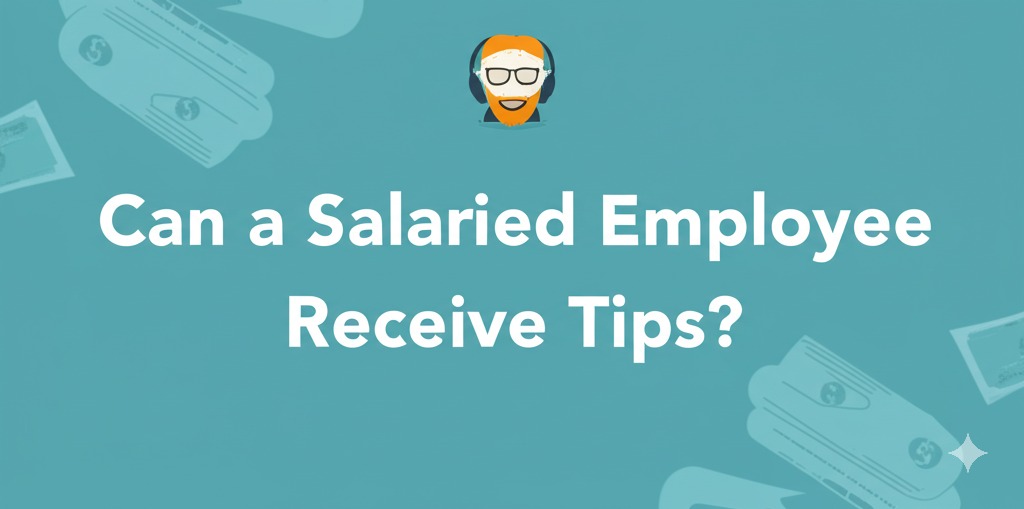
In the hospitality and service industries, tips are a common part of compensation—but what happens when an employee is salaried? Can a salaried employee legally receive tips? This question arises often, especially in businesses that blend managerial duties with customer-facing roles. Whether you’re an employer, a salaried worker, or just curious about labor laws, understanding the nuances of tipping and salaried positions is crucial.
In this article, we’ll explore the legal, practical, and ethical implications of tipping salaried employees, and help you understand how this works under U.S. labor law.
What Is a Salaried Employee?
A salaried employee is someone who earns a fixed income, typically paid weekly or monthly, regardless of the number of hours worked. These positions often fall under the “exempt” category in the Fair Labor Standards Act (FLSA), meaning they are not eligible for overtime pay.
Common Characteristics of Salaried Roles:
- Set weekly or monthly wage
- Often includes benefits like paid time off
- Usually tied to professional, managerial, or administrative jobs
Because salaried roles are not usually dependent on hours or performance in the way tipped positions are, the idea of receiving tips can create confusion.
Are Salaried Employees Allowed to Accept Tips?
Yes, salaried employees can receive tips—but with conditions. Whether or not it’s appropriate or legal often depends on the employee’s role, job classification, and employer policies.
Key Considerations:
- Job duties: If a salaried employee performs tipped work (like serving tables), they may be eligible.
- Employer policy: Some companies prohibit salaried staff from accepting tips.
- State laws: Local labor laws may impose stricter rules than federal guidelines.
Legal Guidelines: What the FLSA Says
The Fair Labor Standards Act (FLSA) governs how wages and tips are handled in the U.S. It draws a clear line between exempt and non-exempt employees.
Exempt vs. Non-Exempt Employees:
- Exempt employees (usually salaried): Not entitled to overtime or minimum wage protections.
- Non-exempt employees: Eligible for overtime and minimum wage, can legally receive tips under tip credit rules.
If a salaried employee is classified as exempt, their employer cannot use tip income to satisfy wage requirements. However, they may still accept tips voluntarily given by customers, provided it doesn’t interfere with job duties or company policies.
Tipping and Management: Can Managers Accept Tips?
This is one of the grayest areas in tipping law. While managers are often salaried, many still engage in direct customer service, leading customers to offer gratuities.
The General Rule:
- Managers and supervisors should not receive tips if it’s perceived as taking income from tipped workers.
However:
- If a manager performs non-managerial tipped duties (e.g., serving food), and the tip is directly given by the customer, accepting it may be allowed.
- Participation in tip pools with non-management staff is typically not permitted.
Employer Policies on Tipping Salaried Staff
Even if the law allows it, a company’s internal policies may prohibit or restrict tipping for salaried employees.
Common Company Policies:
- No tipping allowed for salaried employees to maintain professionalism
- Tips must be reported to HR or pooled among hourly staff
- Required disclosure of received tips for tax purposes
It’s important for salaried workers to check the employee handbook or speak with HR to avoid policy violations.
Tax Implications of Tipping for Salaried Employees
All tips—whether received by hourly or salaried employees—are taxable income and must be reported.
Tax Responsibilities Include:
- Reporting tips to employers (if over $20/month)
- Including tips in annual income for tax returns
- Possibly facing additional withholding depending on tip amount
Failing to report tips properly can lead to IRS penalties, so it’s best to keep accurate records and communicate with payroll.
Ethical and Workplace Considerations
Even if allowed, accepting tips as a salaried employee can create workplace tension or perception issues, especially among hourly workers who rely on tips as a significant part of their income.
Things to Think About:
- Will taking tips affect team morale?
- Could it be seen as favoritism or unfair advantage?
- Is it consistent with your role’s professional image?
Sometimes, salaried employees choose to politely decline tips or donate them to team tip pools or charity to avoid conflict.
When Is It Appropriate for a Salaried Employee to Accept Tips?
Here are a few examples where it may be appropriate for a salaried employee to receive tips:
- A salon manager who personally styles a client and receives a tip directly
- A restaurant owner or manager stepping in to serve when short-staffed
- A concierge in a hotel who provides exceptional personalized service
In each case, the tip is voluntary, not solicited, and not pooled—and ideally, it aligns with company policies.
Final Thoughts: Know Your Rights and Responsibilities
So, can a salaried employee receive tips? The answer is yes, under the right conditions. While federal law doesn’t outright ban tipping salaried workers, the circumstances must be carefully considered, and employer policies must be respected.
Quick Recap:
- Salaried employees can legally accept tips if not prohibited by their employer
- FLSA prohibits using tips to meet wage requirements for exempt employees
- Managers generally should not participate in tip pools
- All tips must be reported for tax purposes

Andre Cuevas provides career insights, job search strategies, and professional advice to help individuals navigate the job market and achieve their career goals.





